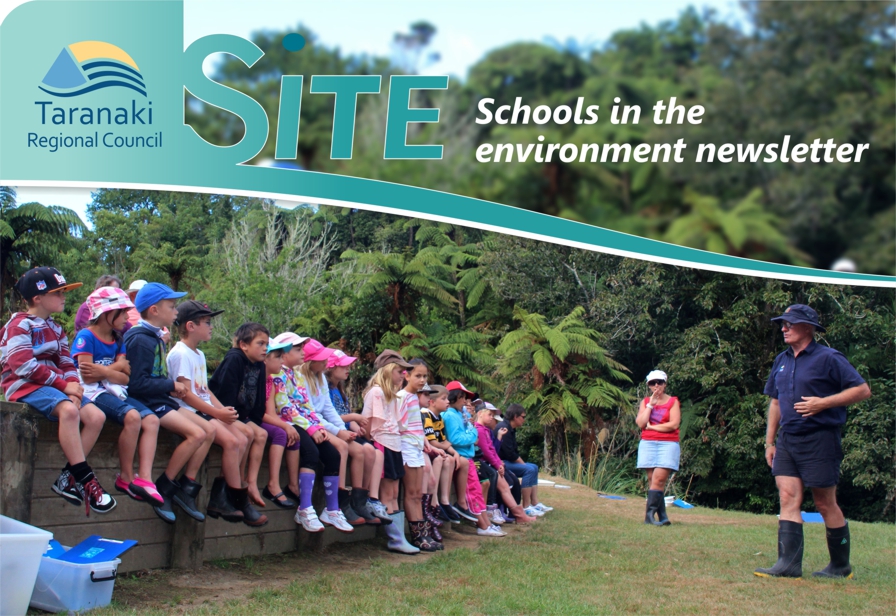This edition: The Council's Education Programme. From alpine rainforest to rocky shore, we offer a range of educational experiences and resources for students and teachers.

Tēnā koutou katoa
I’m delighted to start my new role as Environmental Education Officer and can’t wait to work with you over the next year or so.
My background is in marine biology having worked as the Marine Ecologist at the Taranaki Regional Council (TRC) for the past six years and as a Marine Biology Lecturer at Swansea University UK for 10 years prior to that.

Dr Emily Roberts
I’ve had an invaluable term-long handover with the master himself, Kevin Archer, and I'm rapidly coming up to speed with other areas of the TRC Education Programme.
This issue of SITE provides an ideal opportunity to recap on the programme that we offer. To book lessons and fieldtrips, email me on education@trc.govt.nz, the sooner the better to get your dates.
TRC Education Programme
Here is a general overview of the educational programmes that we currently offer at the Council. We often use the approach of field trips
supported with classroom lessons. We can also provide advice and support with developing your teaching programmes or environment-based
action projects, so if this is something that you might be interested in, please get in touch.
The following programmes are available throughout the year:
Rocky shore studies

The rocky shore is a wonderful habitat to explore.
Rocky reefs dominate the Taranaki coastline and provide a wonderful habitat to explore. Kāwaroa Reef in New Plymouth is the most commonly used site, but if you would be interested in studying a reef location closer to your school get in touch and we can discuss options. At primary and intermediate levels, rocky shore investigation focuses on species identification and adaptations of the organisms to the environment. More advanced quantitative surveys can be undertaken at intermediate and high school level on request.
Stream studies

Students identify the bugs found in a stream.
At primary level, stream studies involve finding and identifying stream bugs and measuring other water quality parameters including water clarity and temperature. Year 12 and 13 classes and adult groups often use the Stream Health Measurement and Assessment Kit (SHMAK) that enables collection of scientifically robust data that can be used to make assessments of stream health.
Wetland studies
There are some excellent wetland areas suitable for school visits. Popular ones are Nowells Lake, near Hawera and Barrett Lagoon and the Peringa Park wetlands in New Plymouth. We have a wetlands study unit available online and we also recommend booking a visit to the Taranaki Wetlands exhibition at Puke Ariki on show throughout 2018.
Mountain studies
Stream studies are an option for school groups visiting the mountain and there are a number of short walks available where students can learn about the importance of weather stations and local wildlife.
Pond studies
Studies investigate invertebrates, plants, birds and other wildlife found in ponds.
Council gardens
We have programmes at all three of the Council gardens - the Rainforest School at Pukeiti, the Woodlands School at Hollard Gardens and the Riverside School at Tupare. There are a range of activities on offer which cover many aspects of native biodiversity, predator control, composting and sustainable gardening. Check out the online study units for activity options (pot-a-plant at Pukeiti is
particularly popular). Visits to Hollard Gardens are best suited to Mondays and Fridays due to staff availability. Trips to Pukeiti and Tupare can be arranged for any day of the week.
Protecting native biodiversity
Native wildlife in Taranaki is under constant attack from pest animals and plants, posing a serious threat to regional biodiversity values. Lessons about pest animals and plants can be taken at school or at the Council gardens. They cover the damage they cause and how they can be controlled. There are also a number of relevant mini units available on the Council website.
Transport
The Council operates a number of bus services in our region. We have personnel who can talk to classes about these services.
---
We also offer lessons on request on Waste Minimisation and Civil Defence Emergency Management (CDEM).
Need support with anything else? We are here to provide advice on any aspects of environmental education relevant to Council responsibilities. Please feel free to contact us.
Download the full newsletter in PDF format: